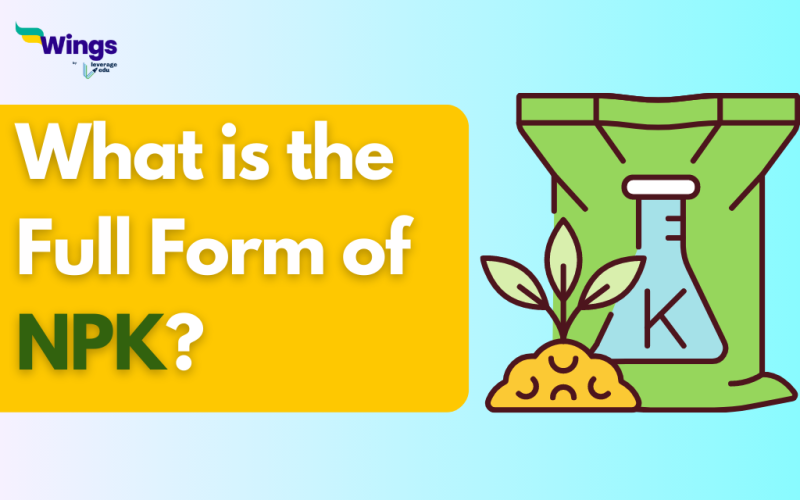NPK Full Form: NPK Stands for Nitrogen, Phosphorous and Potassium. NPK fertilisers, which are three-component fertilisers, offer nitrogen, phosphorous, and potassium. Compound NPK fertilisers and blended NPK fertilisers are the two forms of NPK fertilisers. Blended NPK fertilisers are physical mixtures of single nutritional components, whereas compound NPK fertilisers are made up of chemically bound ingredients.
How Do NPK Fertilizers Affect Plants?
Each of the three nutrients in the N-P-K complex serves a specific purpose.
Nitrogen (N) promotes strong, leafy growth and deep green colour in grasses and other plants. When there is little nitrogen, growth slows and lawns and plants turn pale. Too much nitrogen causes blooming and fruit-bearing plants to focus their energy on green development, sacrificing their blossoms and fruit.
Phosphorus (P) directs energy towards vigorous root development, flowers, fruits, and seeds, while also assisting plants in making efficient use of other nutrients. A deficiency of phosphorus makes roots weak and blossoms and fruit unavailable. Due to environmental concerns over phosphorus runoff into waterways, a growing number of states and counties are restricting the use of phosphorus in lawns.
Potassium (K) promotes general growth. It promotes plant health and balance by regulating root and top development. This has an impact on every element of lawn and garden health, from cold and drought tolerance to disease and insect resistance.
Advantages of NPK
Using fertilisers with an NPK ratio has various advantages:
- Improved plant growth: Providing plants with the proper amounts of nitrogen, phosphorus, and potassium will help them grow and develop more quickly.
- Increased yield: Fertilisers with the appropriate NPK ratio can help boost the yield of fruits, vegetables, and other crops.
- Plant health is dependent on proper nutrition, and utilising fertilisers with a suitable NPK ratio can help guarantee that plants get the nutrients they require.
- Soil fertility can be improved by using fertilisers with an NPK ratio, which adds critical nutrients to the soil. This can aid in the establishment of healthy plants as well as the overall quality of the soil.
- Simplicity: Using fertilisers with an NPK ratio is a simple and effective way to feed plants with the nutrients they require without worrying about the soil’s exact nutrient content.
- Cost-effective: Using fertilisers with an NPK ratio can be less expensive than buying individual nutrients and attempting to mix them yourself.
Disadvantages of NPK
Along with the advantages, there are some drawbacks of NPK fertilizers. Check the disadvantages of NPK below:
- Nutrient imbalances can occur in the soil if fertilisers are not utilised in the correct amount or are not applied to the correct type of soil. This can result in nutritional deficits or excesses, both of which are detrimental to plant growth.
- Environmental effects: If fertilisers are not utilised responsibly, they can have a harmful influence on the environment. Excess nutrients from fertilisers, for example, might leak into neighbouring bodies of water, contributing to eutrophication and other water quality issues.
- Cost: NPK fertilisers might be more expensive than organic fertilisers or compost, which are made from natural ingredients and can be made at home.
- Nutrient availability is limited: Fertilisers with an NPK ratio may not offer all of the nutrients required by plants for optimal growth. Some plants may require additional micronutrients, such as iron, zinc, and magnesium, which may be lacking in these fertilisers.
- Plant types are limited: Fertilisers with an NPK ratio may not be suited for all plant varieties. Some plants, such as acid-loving plants, may require fertilisers with a variable nutrient ratio or nutrients of a specific type.
Must Read: What is the full form of URI?
Must Read: What is the Full Form of CMP in the Share Market?
This was all about NPK full form in fertilizers. Moreover, if you want to know more full forms like this? In the world of short forms, you can rely on our page to know more! Get in touch with our study abroad experts to achieve your international dream today!
 One app for all your study abroad needs
One app for all your study abroad needs













